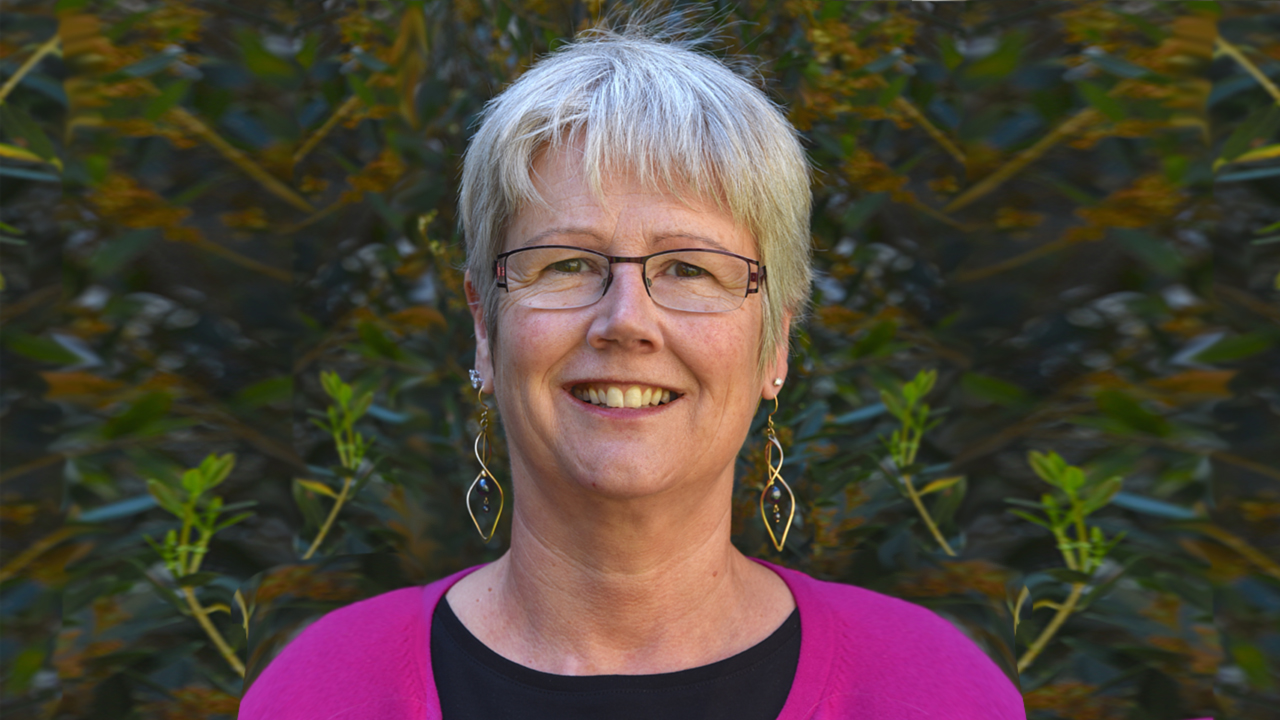Vice-Chancellor, it gives me great pleasure to introduce to you and the congregation Professor Jane Langdale FRS. Jane Langdale graduated from the University of Bath in 1982 with a BSc in Applied Biology, specialising in microbiology. She then obtained a PhD in human genetics at the University of London, which she followed by a five-year postdoctoral position with Tim Nelson at Yale University researching the molecular and genetic basis of development of leaves.
After being awarded an Independent Research Fellowship, she returned to the United Kingdom in 1990 to set up her own group in the Department of Plant Sciences at the University of Oxford. In 1994, Jane was appointed University Lecturer in the department and a Tutorial Fellow of Queen’s College, Oxford. She became Professor of Plant Development and Senior Research Fellow at Queen’s in 2006. Jane was Head of Department of Plant Sciences from 2007 to 2012, Founding Director of the Oxford Martin School’s Plants for the 21st Century Institute, and Associate Head of the Mathematical, Physical and Life Sciences Division from 2008 to 2013.
In 2015, Jane was elected a Fellow of the Royal Society, in recognition of work that has transformed our understanding of how plants make leaves and how leaves have changed through evolution, from those found now in simple plants like mosses to those in the most sophisticated plants like maize.
A significant focus has been on the patterning of distinct cell-types within the leaf and how these patterns influence the efficiency of photosynthesis. Plants with the most efficient type of photosynthesis in hot dry conditions, known as C4, usually have a pattern of leaf cells known as the krantz anatomy (Krantz means wreath or ring in German). Only about 3% of the approximately 300,000 species of land plants have this efficient form of C4 photosynthesis. Maize is a member of this select group but rice, by far the most important human food plant, is not. Scientists, including Jane, are working to create C4 rice, because it has the potential to boost grain yields by 50% and crucially with less water and fertilizer. In his 1798 “Essay on the principle of population”, the Reverend Thomas Malthus, who is buried in Bath Abbey, the usual venue for this ceremony, warned, that growth of population will always outpace production of food, resulting in starvation of the masses. He was wrong. Thanks to past scientific and technological innovations, such as those that powered the Green Revolution in the 1960s and 1970s, agriculture feeds 6.5 billion more people than were alive in 1798; it will successfully feed the estimated peak world population of 11 billion expected around the end of this century. However, this will only happen if we continue to develop talented plant scientists and deploy them, along with the necessary research funding, into projects like C4 rice.
Jane has also been helping to make this happen since 1997 through her role as advisor to the Gatsby Charitable Foundation’s Plant Science Programme. This provides workshops and residential summer schools that encourage undergraduate and postgraduate students to become the next generation of leading plant science researchers and it directly funds a cohort of the most talented PhD students. The Gatsby Foundation, one of the Sainsbury Family Charitable Trusts, also contributed £89 million to the construction of the Sainsbury Laboratory at the University of Cambridge, which opened in 2011. Its ambition is to become a global centre of excellence for plant science research. Its focus, Plant development and its computational modelling. One senses Jane’s guiding hand here too.
Aside from krantz anatomy and leaf evolution, what other passions drive Jane? A love of Airedale terriers is one but perhaps more relevant to today’s gathering is her desire to help others succeed, particularly in a scientific career. In 2006, Jane put this into practice by developing and delivering a series of training workshops at Oxford for postdoctoral researchers and graduate students called “How to succeed as a scientist - From Postdoc to Professor”. In 2011, these were published in a book of the same name, allowing young researchers everywhere to benefit from Jane’s undoubted wisdom on the subject, since she is, by any measure, a very successful scientist.
Vice-Chancellor, I present to you Professor Jane Langdale, who is eminently worthy to receive the Degree of Doctor of Science, honoris causa.
